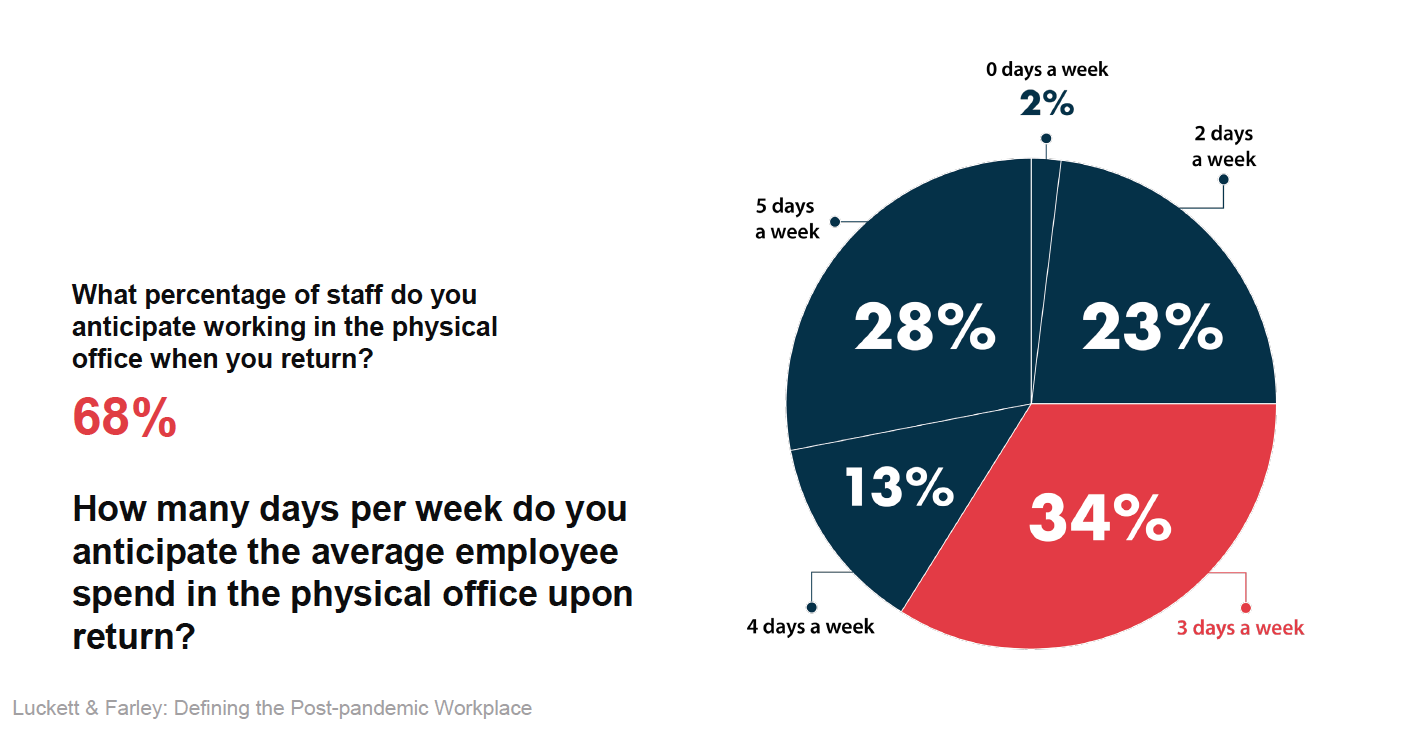As one of the first companies to shift to a fully remote work environment at the start of the COVID-19 pandemic, Luckett & Farley is leading the way again in helping other companies transition back to the office, no matter how that looks for them now.
Luckett & Farley has made strategic partnerships, hired new staff, and hosted informational webinars to better equip our team and clients to best utilize their physical office space going forward.
Human-centered design to support your staff
To help Luckett & Farley support their clients in discerning what kind and how much of certain spaces they need for their team moving forward in a hybrid workplace, they have partnered with Hopewell (now Align), a company dedicated to providing data-based insight into optimizing and aligning physical environments to worker preferences for positive work experiences and peak performance.
Hopewell’s (now Align) survey and analysis process encourages leaders to stop thinking about worker needs as a result of their department or place in the corporate hierarchy, but to focus on the individual’s mode of work to define what technology, spaces, and policies would support them best. Utilizing Hopewell’s (now Align) survey analysis, we will be able to help our clients determine if their space is adequately supporting their team, and if not, how can we design a better workplace.
A strong team focused on creating dynamic workplaces
Based on conversations with clients throughout the past year and evaluating our own needs for our SoBro office, Luckett & Farley realized many companies will need to make changes to better serve their employees as they return to the office. A number of studies show most employees expect greater flexibility between working from home and working at their office after the pandemic, which might require some shifts in how standard offices are currently arranged to allow for hoteling of desks and increased meeting and collaboration space.
 Trisha Johnson, the Director of Procurement at Luckett & Farley, has years of experience in corporate office design. A recent project she completed for Texas Roadhouse’s corporate headquarters included a variety of flexible spaces that can be adjusted for larger or smaller groups with several social and collaboration zones. While the project finished construction shortly before the pandemic, the space will serve Texas Roadhouse employees well when they return.
Trisha Johnson, the Director of Procurement at Luckett & Farley, has years of experience in corporate office design. A recent project she completed for Texas Roadhouse’s corporate headquarters included a variety of flexible spaces that can be adjusted for larger or smaller groups with several social and collaboration zones. While the project finished construction shortly before the pandemic, the space will serve Texas Roadhouse employees well when they return.
Defining the post-pandemic workspace resources
Luckett & Farley launched a free virtual event series this May to bring together a panel of experts in office design, corporate culture, economic development, and innovation to address the challenges decision makers face about the future of work. The first event, Defining the Post-pandemic Workspace, saw leaders exploring the policies and strategies around where and how employees work and engage with each other. Our second event, Creating Workplaces that Benefit Your Employees and Build Your Business, discussed how the internal office can promote community and productivity, as well as how to capture what your team needs in their office spaces during this unique time and how to best adapt your space for greater flexibility.
"I think space will be designed differently going forward, but it's not about social distancing for the pandemic. It's about the way people are going to work. That's what's going to dictate the design.”
— Douglas Edwards, Senior Vice President of Workplace Experience for Humana
Panelists for the event included leaders from the Kentucky Cabinet for Economic Development, JLL, University of Louisville, OneWest, OFS, Humana, Transform•Ed Collaborative, Hopewell, and Greater Louisville, Inc. If you missed the event, the recap is available now.
While working from home has become increasingly popular over the past decade, most office staff across the country have now had some personal experience with this lifestyle. Some are ready to get back to their corporate offices, but many aren’t interested at all, and most want greater flexibility than they had or used before the pandemic.

“Not everyone needs a traditional office environment, or needs it every day,” said Luckett & Farley President and CEO Aric Andrew. “COVID-19 showed us that the best solution varies from person to person and letting them make that choice is a win for everyone.”
Things are changing rapidly, and corporations are working to find the balance between keeping up with the moment, being patient with strategic long-term decisions, and providing their teams with clear communication and expectations. A lot of companies are trying to solve this puzzle themselves – designing their own tools and surveys – when that’s often not where their expertise lies. Hiring reliable partners to support you in the areas outside your expertise will help you reach the finish line quicker and easier and allow you and your team to stay focused on your work. Luckett & Farley is dedicated to supporting our clients and community so they can make informed decisions that best utilize their space and best support their staff as we move into the next phase of the modern workplace.
Unsure if your current office space can meet the needs of your post-pandemic workforce?
|


